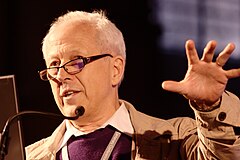George Ellis
George Francis Rayner Ellis (ur. 11 sierpnia 1939 w Johannesburgu) – południowoafrykański naukowiec: fizyk teoretyczny i matematyczny, a także filozof nauki i działacz społeczny[1]; profesor matematyki stosowanej na Uniwersytecie Kapsztadzkim (RPA). Laureat Nagrody Templetona z 2004 roku.
 George Ellis (2012) | |
| Imię i nazwisko urodzenia |
George Francis Rayner Ellis |
|---|---|
| Data i miejsce urodzenia | |
| Zawód, zajęcie | |
| Miejsce zamieszkania | |
| Narodowość | |
| Tytuł naukowy |
profesor |
| Alma Mater | |
| Uczelnia |
University of Cambridge, University of Cape Town |
| Wydział |
Department of Mathematics and Applied Mathematics (University of Cambridge) |
| Wyznanie | |
| Odznaczenia | |
| Strona internetowa | |
Specjalności Ellisa to teoria względności i grawitacja, w tym kosmologia teoretyczna. Autor ok. 500 artykułów naukowych i kilku książek, w tym – wspólnie ze Stephenem Hawkingiem – The Large Scale Structure of Space-Time[2][a]; aktywny popularyzator zagadnień leżących na pograniczu nauki i religii[3].
Poglądy
edytujEllis krytykował niektóre spekulacje fizyków jak teorie strun[1] i hipotezy Wieloświata[4], a także popularną wśród naukowców filozofię redukcjonizmu[1]. Bronił też koncepcji wolnej woli, odwołując się do przyczynowości w rozumieniu Arystotelesa[1]. Określał się jako kwakier[1].
Publikacje
edytujG. Ellis opublikował ok. 500 artykułów[5][6] (w tym liczne w najbardziej prestiżowych czasopismach, tj. Nature), np.:
- Cosmological perturbations and the physical meaning of gauge-invariant variables (1992)[7]
- The case for an open Universe (1994)[8]
- Cosmological models (1998)[9]
- APS Schwarzschild black hole lensing (2000)[10]
- Schwarzschild black hole lensing (2000)[11]
- Gravitational lensing by naked singularities (2002)[12]
- The Emergent Universe: inflationary cosmology with no singularity; Classical and Quantum Gravity (2004)[13]
- Physics, complexity and causality (2005)[14]
Uwagi
edytuj- ↑ Zobacz np. Wielka Ściana, Pustka (astronomia), Wielka Pustka, Wielki Atraktor.
Przypisy
edytuj- ↑ a b c d e John Horgan, Physicist George Ellis Knocks Physicists for Knocking Philosophy, Falsification, Free Will, Scientific American, scientificamerican.com, 22 lipca 2014 [dostęp 2022-01-11].
- ↑ Stephen Hawking, George Ellis: The Large Scale Structure of Spacetime. Londyn: Cambridge University Press; Monographs on Mathematical Physic, 1973.
- ↑ Dr George Ellis. [w:] Counterbalance; Biography [on-line]. www.counterbalance.org. [dostęp 2011-07-10]. (ang.).
- ↑ George F.R. Ellis, Does the Multiverse Really Exist?, Scientific American, scientificamerican.com, sierpień 2011 [dostęp 2022-01-11].
- ↑ Wykaz publikacji Georga Ellisa. [w:] Google Scholar [on-line]. [dostęp 2017-03-25].
- ↑ Wykaz 93 publikacji Georga Ellisa. [w:] Cornell University Library [on-line]. arxiv.org. [dostęp 2017-01-30]. (ang.).
- ↑ Bruni M.,Dunsby P.K.S.,Ellis G.F.R. Cosmological perturbations and the physical meaning of gauge-invariant variables. „Astrophysical Journal, Part 1”. 395 (1), s. 34–53, 1992. ISSN 0004-637X. (ang.).
- ↑ The case for an open Universe. „Nature”. 370, s. 609–615, 25 August 1994. (ang.).
- ↑ George Ellis, Henk van Elst. Cosmological models (Cargèse lectures 1998). „NATO Adv.Study Inst. Ser. C. Math. Phys. Sci.”. 541 (1), s. 1–116, 1999.
- ↑ K.S. Virbhadra, George F.R. Ellis. APS Schwarzschild black hole lensing. „Physical Review D, arXv:astro-ph”, s. 1–10, 19 January 2000. University of Cape Town. (ang.).
- ↑ George F.R. Ellis, K. S. Virbhadra. Schwarzschild black hole lensing. „Phys. Rev. D 62084003”, 2000. (ang.).
- ↑ George F.R. Ellis, K.S. Virbhadra. Gravitational lensing by naked singularities. „Phys. Rev. D 65, 103004”. 65 (10), 2002. The American Physical Society. DOI: 10.1103/PhysRevD.65.103004. (ang.).
- ↑ George F.R. Ellis. The Emergent Universe: inflationary cosmology with no singularity. „arXiv:gr-qc”, 2004. iopscience.iop.org. (ang.).
- ↑ George F.R. Ellis. Physics, complexity and causality. „Nature”. 435, s. 743, 9 June 2005. (ang.).
Linki zewnętrzne
edytuj- Publikacje w INSPIRE, the High Energy Physics information system (ang.)
- Wywiad radiowy z kwakrem i kosmologiem George'em Ellisem, laureatem Nagrody Templetona za badania na pograniczu nauki i religii. speakingoffaith.publicradio.org. [zarchiwizowane z tego adresu (2010-07-04)].
- George F.R. Ellis, On the Nature of Cosmology Today (2012 Copernicus Center Lecture), Centrum Kopernika Badań Interdyscyplinarnych – Uniwersytet Jagielloński, kanał „Copernicus” na YouTube, 28 stycznia 2013 [dostęp 2022-01-11].
- ISNI: 0000000116981956
- ORCID: 0000-0001-8484-0629
- VIAF: 109637661
- LCCN: n79009896
- GND: 170017478
- NDL: 001328104
- BnF: 122989362, 13479907s
- SUDOC: 031850928
- NLA: 35331848
- NKC: uk2006305222
- BNE: XX989957
- NTA: 071045635
- BIBSYS: 2092091
- CiNii: DA02415379
- PLWABN: 9810548879805606
- NUKAT: n01095168
- J9U: 987007320206405171
- LNB: 000263886
- CONOR: 45181027
- KRNLK: KAC2022A1393
- LIH: LNB:C7Vv;=Bs